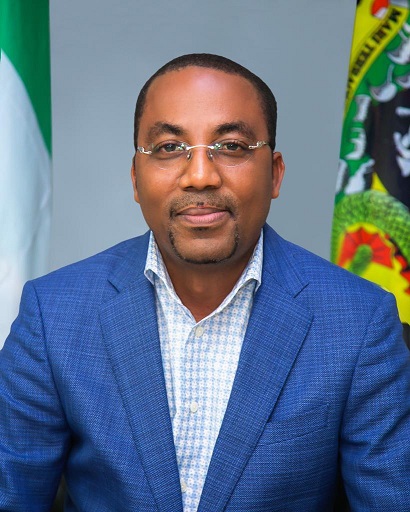The Nigerian Ports Authority (NPA) has raised its Internally Generated Revenue (IGR) between January and September 2021 by 120 per cent, just as it also reduced its operating expenses by 20 per cent of its budget for 2021.
These remarkable improvements achieved despite the impact of Covid-19 pandemic on global trade and supply chain logistics, were declared in documents presented by the Acting Managing Director, Mohammed Bello-Koko, to the House of Representatives Committee on Ports and Harbours recently.
According to the Acting Managing Director’s presentation to the Committee, as of the end of September 2021, the Authority earned N256.28bn in IGR as against the expected N214.65bn (approved estimate N271.70bn) for the same period, representing a performance of 120% or 95% of its total annual budget for 2021.
For operating expenses, as of the end of September 2021, actual spending stood at N55.10bn as against the budgeted figure of N65.49bn, comprising employees’ benefits, pension costs, towage services, supplies, repairs & maintenance and other administrative overheads. This indicates a “savings” of N10.39bn or 85% performance of the approved budget of N87.32bn.
The documents also indicated that in compliance with the quarterly remittance of its operating surplus to the Consolidated Revenue Fund (CRF) and provisions of the Finance Act 2020, the Authority remitted the sum of N62.66bn to CRF for the year 2021 as of October 31, 2021, while a cumulative sum of N89.9bn has been transferred to the CRF in the last six months.
At the current state of increased revenue drive, it is projected that the Authority would exceed its 2021 revenue projections and the projected transfer to the CRF for the year 2021 which is expected to be over N80bn, which would be the highest in the history of the Authority.
This impressive revenue performance achieved by the Bello Koko- led Management of the Authority, which has been in office for only six months, has been highly applauded by industry stakeholders.
At the presentation, Bello-Koko told the House Committee that contrary to news reports insinuating that Nigerian ports were the most expensive in the sub-region, a study commissioned by the Authority with the support of UKAid in 2019, indicated that it is actually cheaper for general and container vessels to berth in Nigeria than in Ghana or Togo.
He explained that a huge chunk of what shippers or cargo owners spend to clear their consignments include terminal and freight charges paid to terminal operators and shipping companies, payments for customs duty, inspection services, haulage, insurance and other sundry trade levies and fees, which are outside the purview of the Authority.
He added that “Aside the towage dues which was reviewed in 2015, Port tariffs in Nigeria have remain same since 1993.”
On his assumption of office in May 2021, the Bello- Koko led Management has focused on improving the overall efficiency of the nation’s port industry, taking deliberate steps to reposition the Authority to focus on cost-optimization and quality service delivery, while maximizing business value for port operators and users.
The Acting Managing Director also disclosed in the document that “To support the economic diversification agenda of the Federal Government through the promotion of non-oil exports, the Authority has partnered with the Nigerian Export Promotion Council (NEPC) for the establishment of third party dedicated export terminals or export parks to be located in Lagos and Ogun states.
“The initiative is aimed at the processing, packaging and certification of exports under a one stop platform that houses all relevant agencies responsible for quality control and regulatory validation of exports before shipment.
“The objective is to enhance and fast-track Nigerian export cargo for shipment at the export parks without any further port clearance protocol. A pilot project has been established at the Lillypond Container Terminal in Lagos, while 10 other exports terminals are in the process of being certified in order to begin operations by 1st quarter of 2022.
“The Authority is in the process of consolidating its various electronic platforms under a unified port community system.”
The document also shows that the NPA currently utilizes the following technology platforms:
- Oracle Financials and Human Resources Planning
- Enterprise Resource Planning ERP
- Revenue & Invoicing Management System (RIMS)
- e-Ship Entry Notice (e-SEN)
- customs portal for online submission of bills
- Hyperion budgeting
- 3CI (Command, Control and Communication & Intelligence)
- Truck Call-Up Access Control
- Harbours System Linked with the 3CI for harmonization of vessel operations
The Management agenda is to consolidate all the platforms into a single port community system to allow for ease of transaction and eliminate impediments associated with manual processes.
It also disclosed that the International Maritime Organization (IMO) is providing technical aid to the Authority for the development of the Port Community System.
To ensure immediate commencement of port Infrastructure & Rehabilitation, the Federal Ministry of Transportation (FMOT) constituted a Technical Committee with the purpose to identify the operational issues of the ports and assessing state of the existing port Infrastructure starting with the ports in Lagos. A technical consultant engaged for that study has already concluded the preliminary assessment of the ports.
The NPA is already reviewing alternative sources of long term, low interest capital for port infrastructure development by engaging reputable funding institutions like the African Development Bank, the Chinese Exim Bank and other Infrastructure Development Agencies.
In addition, port terminal operators are also being encouraged to explore such windows to fund the rehabilitation of the facilities and port equipment with amortisation as an option of recouping investments. This is to ensure immediate commencement of rehabilitation of the ports and quay walls and also deeper drafts to accommodate large modern day vessels.
The first public action of the Bello- Koko led Management was to rejig the implementation of the electronic call up system for trucks (known as ETO). It ensured all identified lapses associated with the system were addressed, particularly breaches observed while the Taskforce saddled with the responsibility of enforcing compliance was in charge.
Accordingly, Bello-Koko stated that “series of stakeholder engagements were held with the top hierarchy of the Military, the Nigerian Police, other security agencies, the Lagos State Government and other critical industry stakeholders. The outcome of these engagements led to tremendous improvement in travel time along the Apapa port access roads in Lagos.
“The Authority in conjunction with the FMOT also reached out to the Federal Ministry of Works on the timely completion of the reconstruction of Sunrise Bus Stop to the Mile 2 stretch of the Tincan Island Port corridor.
“To complement the above, the NPA also launched “Operation Green” to remove and clear all illegal structures and shanties on the Apapa and Tincan Island Port access roads. A great deal of success was recorded by this operation as exemplified by the resultant free flow of traffic to and from the ports.
“The Authority is cashing on this success to embark on awareness and sensitization of port stakeholders to drum support towards the implementation of a sustainable policy on traffic decongestion along port corridors.
“In this regard, the Management has just procured twenty-four (24) motorcycles to be added to existing assets and in support of continuing collaboration and operations for a better traffic management to the ports.”
The Authority said efforts are on to address identified areas of security vulnerabilities with the deployment of Electronic Access Control with Apapa and Onne ports as pilot projects, while procurement process has commenced for the full perimeter fencing of Tincan Island Port Area to further consolidate compliance with ISPS code.
It added that further compliance to ISPS code, especially as it relates to vulnerabilities of the ports waterfront, Management has procured 13 units of Security Patrol Boats (SPB) ready to be deployed across all pilotage districts including the establishment of Marine Police units in Calabar and Delta ports where none currently exists.
Expectations are that it would reduce incidents of attack on vessels around the port area and boost the confidence of the international shipping community to use Nigerian ports.
To enhance efficient marine services, particularly monitoring and facilitation of communication with vessels, the Authority said Management renovated the dilapidated Control Towers at both Apapa and Tincan ports and new communication gadgets have been installed to ensure prompt and effective communication with vessels coming into the port channels.
This has led to significant improvement in harbour services as well as increase in port revenue. In addition, marine equipment including Pilot Cutters, Security Patrol Boats and Tug Boats are also being deployed, the NPA said.
To improve cargo evacuation from the port and facilitate quick return of empty containers to the port, the Management has reviewed the modalities for registration and operations of barges.
The new regulatory framework which includes a new Standard Operating Procedure (SOP) took effect from 1st September, 2021. It provides for enforcement of the safety and operational standards including the requirement to install radio communication equipment on-board to facilitate the sharing of traffic information.
According to the Management, the Authority is in the process of deploying an electronic call-up system for barges, similar to the one for trucks, to streamline their operations and movements. It said rates have been approved for barge operations, to ensure more revenue to the Government.
It said the Authority supported the use of privately managed jetties as part of measures to optimize inland barge services at the port. This has encouraged barging as a mode for the promotion of inter-modal transportation.
It also said that the use of barges has taken some pressure off the roads, adding that the movement of cargo by barge this year alone has recorded well over 200,000 TEUs. This has also generated huge employment opportunities; in stevedoring, terminal operations and other marine services. It also becomes another revenue stream to the Authority in particular and Government in general.
The NPA indicated that “To address the menace created by trucks carrying empty container and to ensure that Nigeria is not made a dumping ground for empties, the Authority began to enforce the return of empties, where vessels are compelled to ship back at least 80% of the number of imports shipped in.
“To guarantee safety of records and documentation, the NPA Management recently commissioned an ultra-modern and fully digitalized archival system of document preservation and storage.
“From May till date, the Bello-Koko led Management has managed to steady the ship by running an inclusive -style of administration along with regular consultation with relevant agencies of government and trade groups operating in the port.
The current NPA leadership has received commendations from industry stakeholders for focusing on costs optimization to shore up revenue accruable to government, exploring alternative funding sources to address ageing port infrastructure and reposition Nigeria as hub for maritime trade in Africa.
As 2021 winds down, the feelers from the new administration is that all hands are on deck to ensure that the Authority remains a veritable and profitable national asset, even as the Bello Koko led Management shore up its responsibilities to customers under a business-friendly port system, without compromising on security.


































































